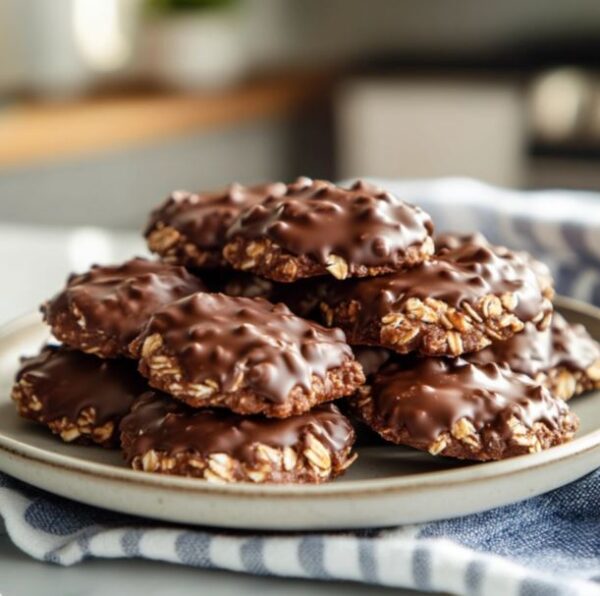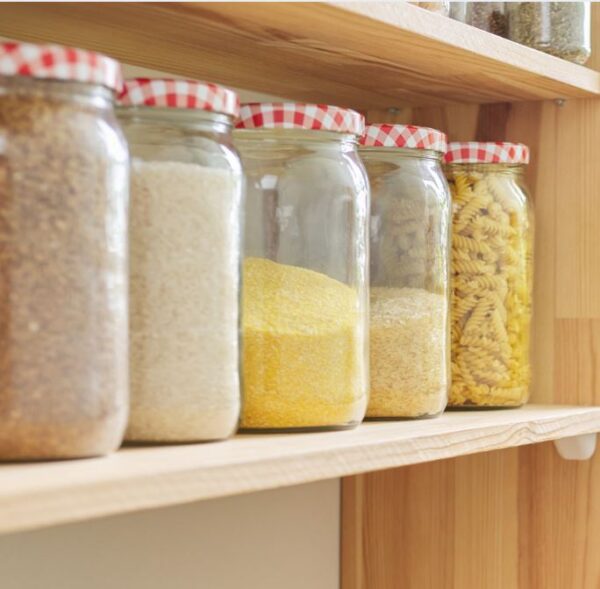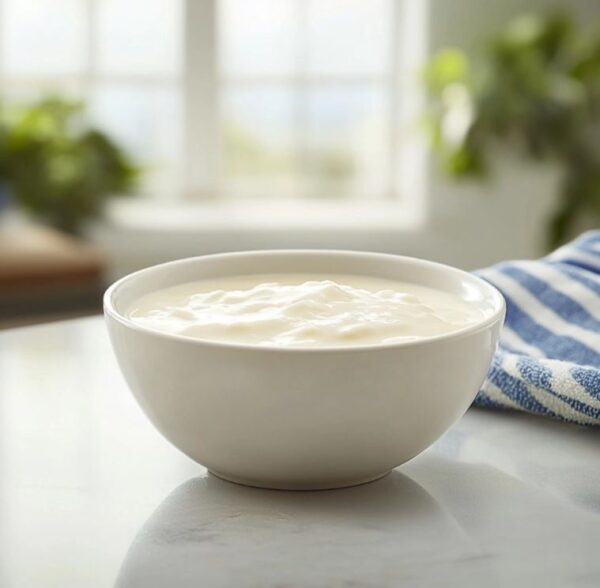What Are Overnight Oats Anyway?
Here are your overnight oats FAQ and answers. Welcome to the ultimate destination for all your overnight oats questions! If you’ve ever wondered how to create the perfect bowl of creamy, nutritious, and hassle-free oats that are ready to enjoy as soon as you wake up, you’ve come to the right place.
In this recipe blog, we’ve gathered a treasure trove of tips, tricks, and tantalizing overnight oats recipes to satisfy your curiosity and your taste buds.
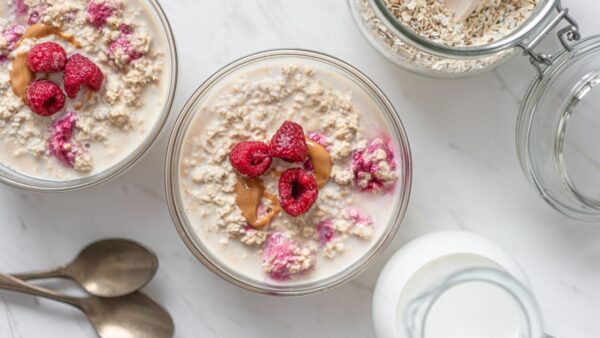
So, let’s dive into the world of these convenient, customizable, and delicious breakfast delights, and ensure that your mornings are always off to a wholesome and satisfying start. Your overnight oats journey begins here!
Overnight Oats FAQ
1. What are overnight oats?
Overnight oats are a popular and convenient breakfast option made by soaking rolled oats in a liquid, typically milk or yogurt, along with various flavorings and toppings, and leaving the mixture in the refrigerator to sit and soften overnight.
The slow soaking process allows the oats to absorb the liquid and flavors, resulting in a creamy, no-cook, and cold oatmeal-like dish.
They can be enjoyed straight from the fridge in the morning, and their versatility allows for endless variations with different fruits, nuts, sweeteners, and spices, making them a customizable and nutritious breakfast choice.
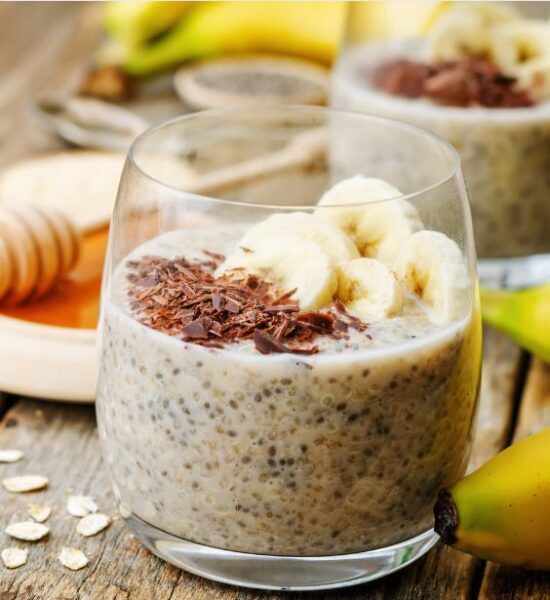
2. Why are overnight oats so popular?
Overnight oats have gained immense popularity due to their irresistible combination of convenience, customization, and health benefits.
By simply soaking rolled oats in liquid (usually milk or yogurt) and adding your favorite flavorings and toppings, they save a ton of time in the morning.
Their adaptability allows for endless variations, catering to individual tastes and dietary preferences, from fruity to nutty or even chocolatey.
The slow soaking process softens the oats. And this also retains their nutritional value. They are a hearty and filling breakfast that’s high in fiber, protein, and energy.
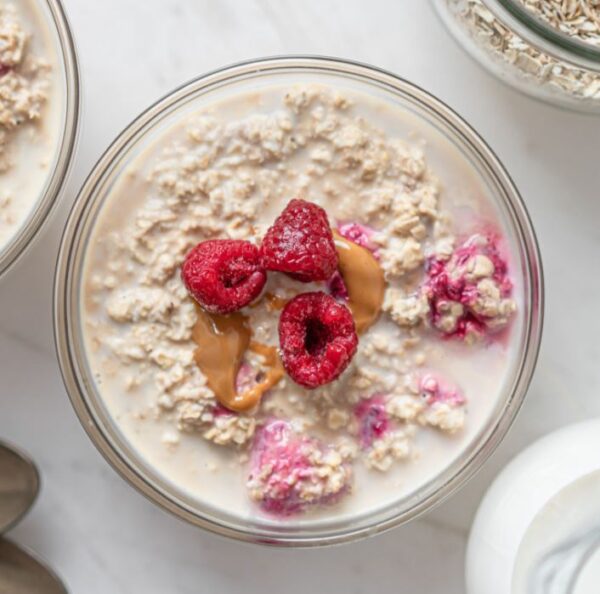
3. What other names does overnight oats go by?
Overnight oats” is the commonly used name for this type of dish. The name comes from the preparation method, where you soak oats in liquid overnight. This helps them to soften and absorb the flavors.
You might also hear them referred to as “cold oats” or “no-cook oats” because they don’t require any cooking. The oats soften through the soaking process. “Overnight oats” has become the most popular and recognized term for this convenient and customizable breakfast option.
4. What are the best oats to use for overnight oats?
The best oats to use for overnight oats are old-fashioned rolled oats. These are whole oats that have been rolled flat to make flakes. They absorb liquid well and soften during the overnight soaking process. Rolled oats provide a creamy and satisfying texture to your overnight oats.
Steel-cut oats, on the other hand, are not ideal for overnight oats. They require longer cooking times and soaking times. Using them in overnight oats may result in a very chewy and hard texture.
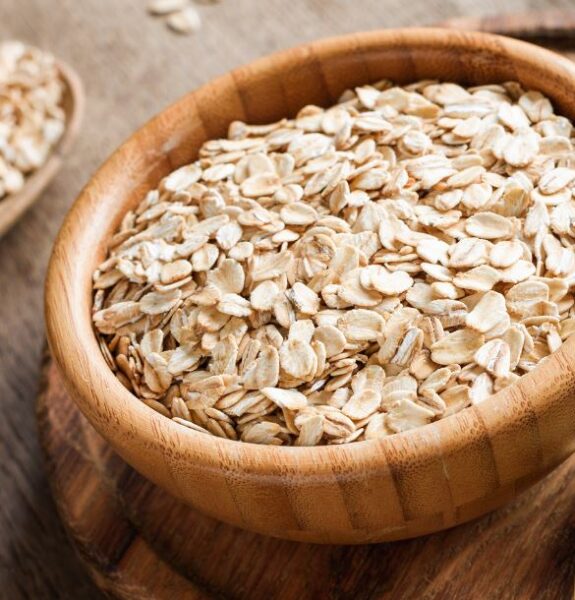
5. Can you make overnight oats with instant oatmeal?
Yes, you can make overnight oats with instant oatmeal (also known as porridge oats). Instant oatmeal is pre-cooked and finely rolled oats, which means it will absorb liquid quickly. The result is a softer texture compared to old-fashioned rolled oats.
To make overnight oats with instant oatmeal, mix the instant oatmeal with liquid such as milk or yogurt. Then add any flavorings or toppings you prefer.
Keep in mind that because instant oatmeal absorbs liquid faster, you might need to use a bit less liquid than you would with old-fashioned rolled oats. Experiment with the ratios to achieve your desired consistency, and enjoy the convenience of a quicker breakfast option.
6. Do overnight oats need to be cooked first?
No, overnight oats do not need to be cooked. They are a no-cook breakfast option. The oats are soaked in a liquid (such as milk or yogurt) and left to soften and absorb the flavors through the overnight resting process in the refrigerator.
This slow soaking method softens the oats, making them edible and enjoyable without any cooking. The result is a convenient, ready-to-eat breakfast that can be served cold or at room temperature.
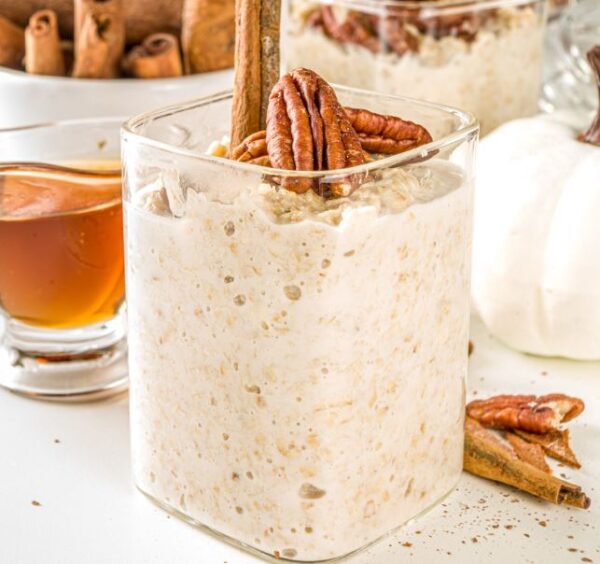
7. How long to soak overnight oats?
Overnight oats are left to soak in the refrigerator for at least 6-8 hours or overnight, as the name suggests.
This extended soaking time allows the oats to absorb the liquid, soften, and develop their flavors. However, you can eat overnight oats sooner if you prefer a less intense soaking period.
Some people enjoy their overnight oats after just a couple of hours in the fridge. Others may find that the texture and flavor are best after a full night of soaking.
It’s a matter of personal preference, so you can adjust the soaking time to suit your taste and schedule.
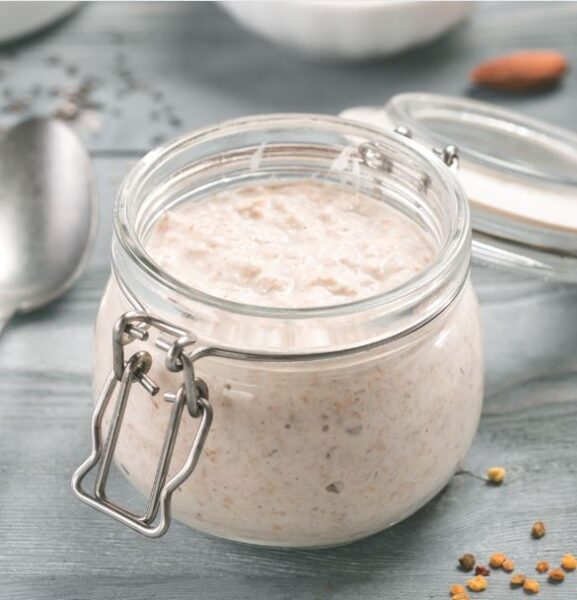
8. How long does it take to make overnight oats?
Making overnight oats is a quick and straightforward process that only takes a few minutes to prepare.
To create a basic batch of overnight oats, you’ll need a container or jar with a lid. Start by measuring out your preferred amount of old-fashioned rolled oats and placing them in the container.
Next, add your choice of liquid, such as milk or yogurt, to the oats. Sweeten and flavor your oats with ingredients like honey, vanilla extract, or any desired sweetener and spices. You can also add fruits, nuts, seeds, or any other toppings at this stage.
Mix everything together, close the container with a lid, and refrigerate it. The actual hands-on time for preparation is typically under 10 minutes. The oats will be ready to enjoy after at least 6-8 hours of soaking.
For a beginner recipe, we suggest making our easy Raspberry & Banana overnight oat recipe.

9. Can you make overnight oats with water?
Yes, you can make overnight oats with water instead of milk or yogurt. While milk and yogurt are commonly used to create a creamier and more flavorful texture, using water is a suitable option, but not the best.
Water will soften the oats but may result in a less creamy consistency compared to using milk or yogurt. To enhance the flavor and creaminess when using water, you can add additional flavorings like honey, vanilla extract, or a dairy-free milk alternative if you prefer.
10. Do overnight oats expand?
Yes, a little bit. Overnight oats can expand or increase in volume as they soak. The oats absorb the liquid you’ve added to them, causing them to soften and swell in size.
The expansion is why you’ll often find that a container of overnight oats appears thicker and creamier in the morning.
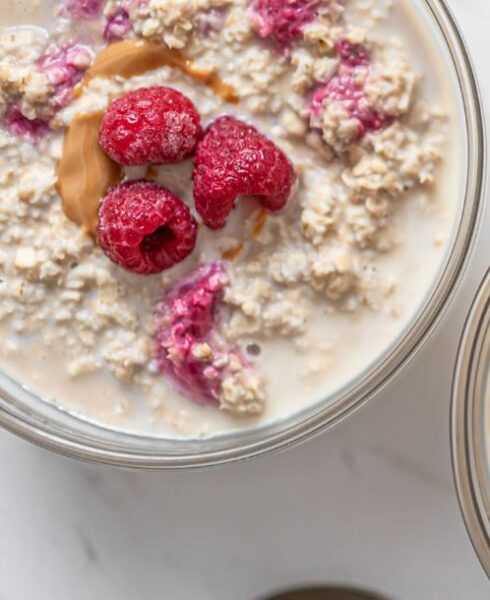
11. How long do overnight oats stay fresh
Overnight oats can stay fresh in the refrigerator for about 3-5 days. The exact duration may vary slightly depending on the ingredients used and how they were stored.
It’s best to consume them within about 4 days to ensure they maintain their taste and texture. After this period, the oats may become too soft or lose their desired consistency.
If you want to prepare a batch for the entire workweek, consider making individual servings in separate containers to keep them as fresh as possible.
Additionally, you can add ingredients like fresh fruit or toppings just before serving to maintain their freshness and crunch.
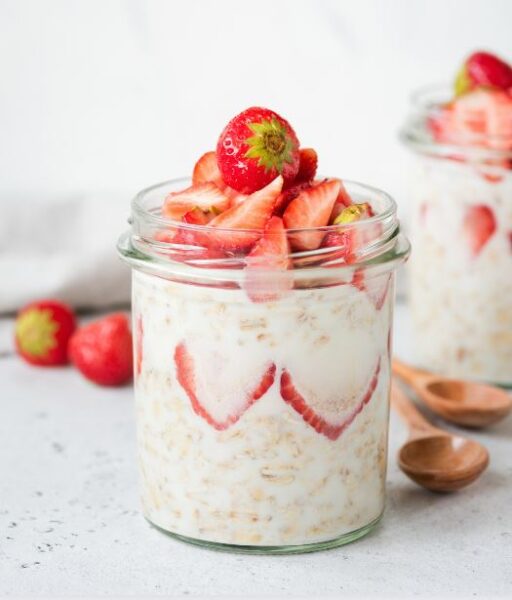
12. Can overnight oats be frozen?
Yes, you can freeze overnight oats. Freezing overnight oats can be a convenient option for meal prep or if you want to make larger batches in advance.
To freeze them, prepare your overnight oats as you normally would and then portion them into airtight, freezer-safe containers or individual servings. Make sure to leave some space at the top of the container, as the oats may expand as they freeze.
When you’re ready to enjoy them, simply thaw the frozen overnight oats in the refrigerator overnight – 48 hours. You may need to give them a good stir before serving to ensure a consistent texture.
While freezing overnight oats can affect the texture slightly, they can still be a convenient and time-saving breakfast option.
13. Are overnight oats just for breakfast?
While overnight oats are traditionally considered a breakfast dish, they can be enjoyed at any time of the day, making them a versatile option for meals or snacks.
Their adaptability and convenience make them suitable for various occasions. You can also customize them to suit your taste preferences, whether you prefer sweet, savory, or somewhere in between. Check out our Pumpkin Pie Overnight Oats recipe that’s perfect for fall.
For breakfast, they provide a quick and nutritious option to start your day. However, you can also have overnight oats as a mid-morning or afternoon snack, or even as a dessert.
The combination of oats, yogurt, and toppings allows for endless flavor possibilities, making them a versatile choice that can be enjoyed whenever you like.
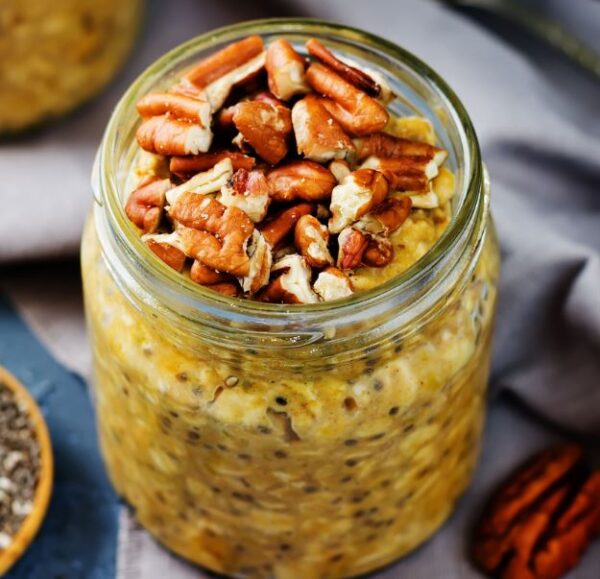
14. How do you eat overnight oats?
Eating overnight oats is a straightforward and versatile process. Once you retrieve your container of overnight oats from the refrigerator, it’s a good idea to give them a quick stir to ensure all the ingredients are well combined.
You can choose to enjoy your overnight oats as they are, straight from the container, if you prefer a quick and convenient meal. Alternatively, to enhance the experience, add your favorite toppings, such as fresh fruit, nuts, seeds, a drizzle of honey or natural maple syrup, a dollop of yogurt, or a sprinkle of cinnamon.
If you want to change the serving container or add extra toppings, transfer your oats to a bowl or dish, though this step is entirely optional.
15. What containers are best for overnight oats?
Wide mouth mason jars or weck jars are an ideal container for overnight oats for several reasons. They feature lids that forms an airtight seal, ensuring your oats remain fresh and preventing potential spills when you’re on the go.
These glass jars are durable, easy to clean, and their transparent sides allow you to appreciate the layers of oats and toppings. With a variety of sizes available, you can easily customize your portion.
Wide mouth mason & weck jars are also eco-friendly as they are reusable, making them a sustainable option, and you can conveniently mix and shake your ingredients within the jar, ensuring even distribution.

16. Do overnight oats need to be refrigerated?
Yes, overnight oats should be refrigerated during the soaking process and after preparation. Refrigeration helps maintain the freshness and food safety of the ingredients, especially when dairy products like milk or yogurt are used.
Leaving them in the refrigerator ensures that the oats and other ingredients do not spoil or develop harmful bacteria, which can happen if left at room temperature for an extended period.
Properly stored in the refrigerator, overnight oats will be safe to consume, and the chilling process also contributes to their creamy and refreshing texture.
If you are taking your overnight oats to work or camping, consider getting a cold storage lunch bag to keep everything fresh.

17. What can I add to overnight oats?
You can add a plethora of delightful ingredients to your overnight oats to tailor them to your taste and dietary preferences.
Begin with your choice of liquid, whether it’s dairy or dairy-free alternatives like almond, soy, or coconut milk, or even fruit juice for added flavor. Old-fashioned rolled oats or quick oats can serve as the base, depending on your texture preference. The good news is that there are many milk alternatives to overnight oats.
To sweeten your oats, consider honey, maple syrup, agave nectar & brown sugar. You can also make them with sauces, like blueberry sauce or grape sauce.
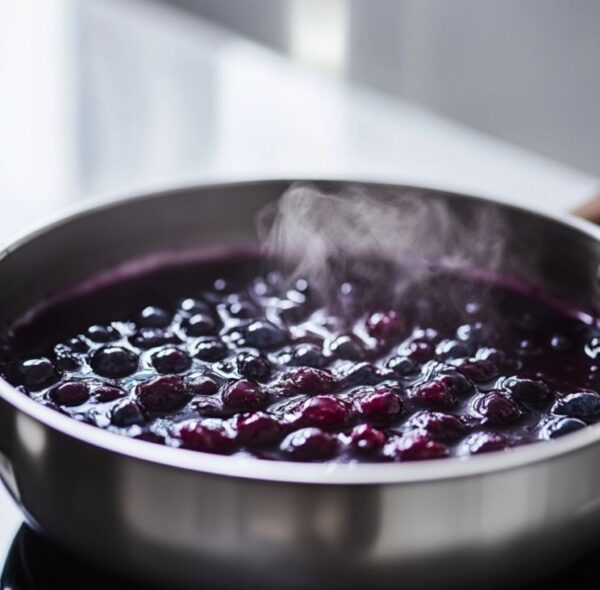
Add a burst of freshness with fruits such as berries, bananas, apples, mango, or your favorite fruit. For extra texture and nutrition, incorporate nuts and seeds like almonds, walnuts, chia seeds, flaxseeds, or sunflower seeds.
Dried fruits like raisins, cranberries, apricots, or dates provide a natural sweetness, while nut butters like peanut or almond butter contribute a creamy richness and added protein.
Visit our Toppings & Ingredient lists for more ideas and inspiration.
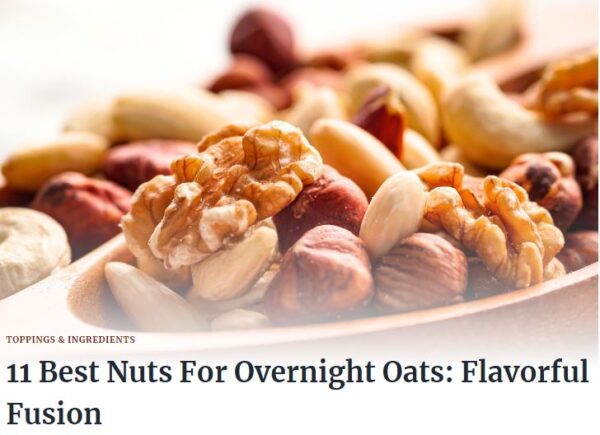
18. Do overnight oats taste like oatmeal?
Overnight oats have a similar base ingredient to traditional oatmeal, which is oats, so they share some common flavors. However, the texture and taste of overnight oats can be somewhat different from traditional oatmeal.
Overnight oats are typically cold and have a creamier, more pudding-like texture due to the soaking process in liquid. They often have a milder, less starchy taste compared to hot oatmeal.
Traditional oatmeal, cooked on the stovetop or in the microwave, is hot and has a thicker, more porridge-like texture. The cooking process can bring out a nuttier flavor and a heartier texture in the oats.
The taste of both depends on the specific ingredients and flavorings used, so you can customize your overnight oats to taste similar to oatmeal or give them a unique flavor profile by adding various toppings, sweeteners, and spices.
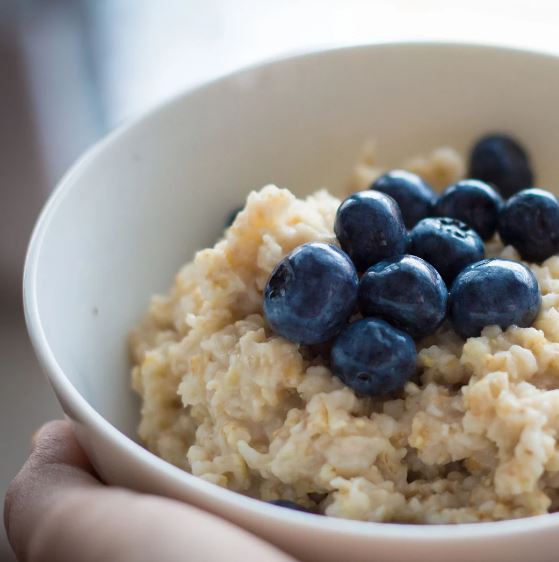
19. Are overnight oats healthy?
Overnight oats can be a healthy breakfast option, but their nutritional value depends on the ingredients you use and how you prepare them.
Oats themselves are a nutritious whole grain, high in fiber, vitamins, and minerals. They can provide sustained energy and may help with weight management, heart health, and digestive regularity.
To make overnight oats healthier, consider using low-fat milk or dairy-free alternatives, adding fresh or frozen fruits, and incorporating nuts or seeds for extra nutrients and healthy fats.
However, be mindful of the amount of added sweeteners as excessive sugar can reduce the overall healthiness of your oats.
The key to a healthy breakfast is balance and moderation. Choose whole, unprocessed ingredients, control portion sizes, and tailor your overnight oats to meet your dietary needs and preferences.
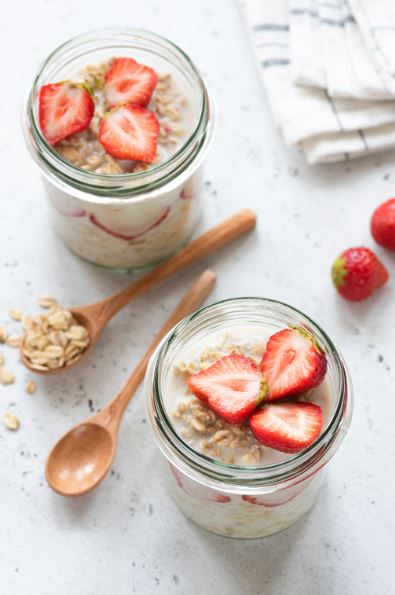
20. Are overnight oats good for weight loss?
Overnight oats can be a beneficial addition to a weight loss or weight management plan due to their high fiber content, which promotes satiety and digestive regularity, and their sustained-release complex carbohydrates, which help prevent energy crashes and overeating.
They are highly customizable, enabling you to create lower-calorie options to fit your dietary needs, and portion control is made easy when prepared in individual servings.
However, it’s crucial to be cautious with ingredients like sweeteners and toppings that can add unnecessary calories and sugar.
While overnight oats can be a valuable component, they are most effective when integrated into a balanced and healthy diet and lifestyle, taking into account overall dietary choices and physical activity levels.
21. Why did my overnight oats turn runny?
Overnight oats can turn runny if the ratio of liquid to oats is too high, causing the oats to absorb less liquid and remain overly watery. To achieve the desired creamy consistency, it’s important to maintain the right balance of oats to liquid.
Additionally, the type of oats used can affect the outcome; quick oats or instant oats tend to absorb liquid more quickly, while old-fashioned rolled oats provide a thicker texture.
If your overnight oats are too runny, you can try adjusting the ratio by adding more oats or refrigerating them for a longer period to allow for better absorption, or simply stir in some more oats before serving to thicken the mixture.
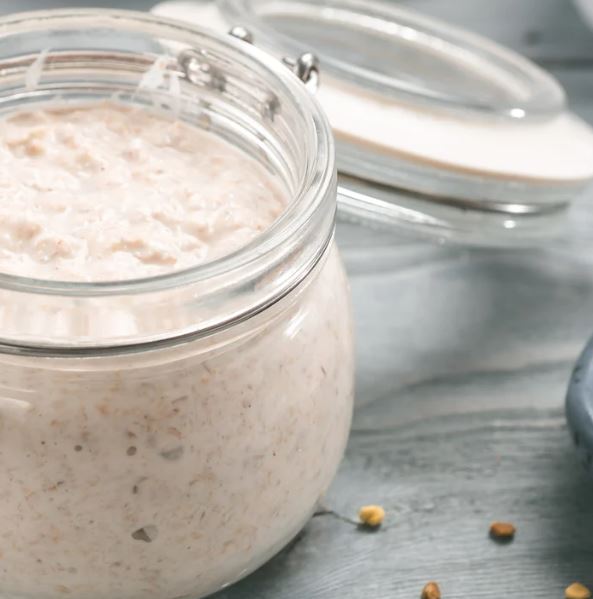
22. Why do my overnight oats taste sour?
If your overnight oats have a sour taste, there could be several factors contributing to this flavor. Firstly, it’s essential to check the freshness of your ingredients, especially the milk or yogurt you used, as spoiled dairy can introduce a sour taste to your oats.
Additionally, if your oats were left at room temperature for an extended period or in warm conditions, the mixture may have undergone fermentation, resulting in a sour taste. It’s crucial to store your overnight oats in the refrigerator to prevent this.
Some yogurts contain live cultures that can impart a slightly tangy or sour flavor, so the type of yogurt you use can affect the taste. Lastly, certain ingredients, like berries or specific fruits, can naturally add tartness to your overnight oats.
To avoid sourness, ensure your ingredients are fresh, refrigerate your oats, and tailor your ingredient choices to your flavor preferences.
23. Can you heat overnight oats with yogurt?
It’s not common to heat overnight oats with yogurt, as the idea behind overnight oats is to prepare a cold and no-cook breakfast option.
However, if you prefer your oats warm, you can certainly heat them with yogurt. Just be aware that heating yogurt can change its texture and taste. To do so, you can transfer your overnight oats to a microwave-safe container and heat them in the microwave for 1-2 minutes, stirring occasionally until they reach your desired temperature.
Keep in mind that the texture may differ from traditional stovetop oatmeal, as the oats will remain somewhat softened from the overnight soaking.
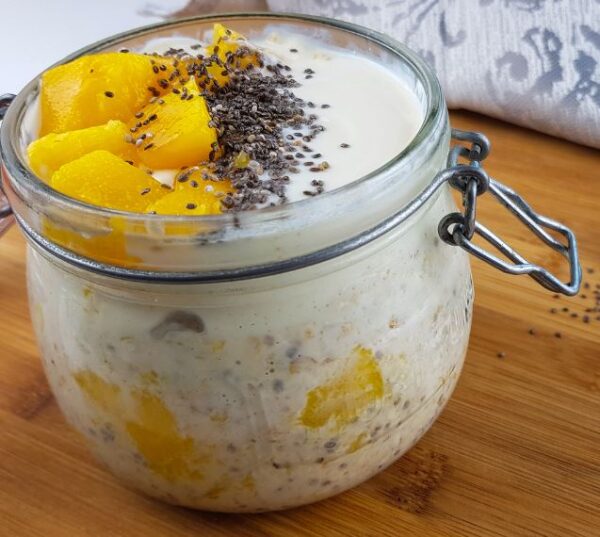
24. What is the difference between oatmeal and overnight oats?
The key distinction between oatmeal and overnight oats lies in the preparation method. Oatmeal is typically made by cooking rolled or steel-cut oats on the stovetop or in the microwave with water or milk until they reach a creamy, porridge-like consistency.
In contrast, overnight oats are a no-cook, cold version of oatmeal, prepared by soaking rolled oats in liquid, such as milk or yogurt, along with various flavorings and toppings, and leaving the mixture in the refrigerator to soften and absorb the flavors overnight.
This results in a convenient, chilled, and often creamier breakfast option that requires no cooking and can be enjoyed straight from the fridge, making it perfect for busy mornings.
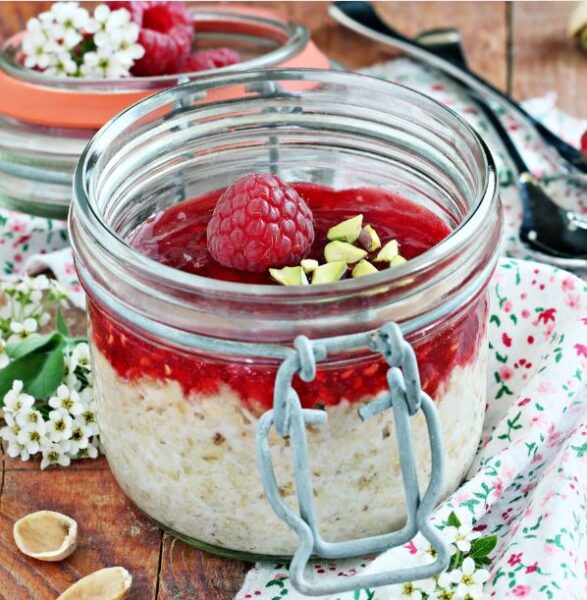
25. Where can you buy premade overnight oats?
Check your local health food store first. Specialty health food stores often offer a variety of premade overnight oats, including options catering to specific dietary preferences such as gluten-free or vegan. You can also get premade overnight oats online.

Well, that concludes some common questions and we hope yours has been answered. Thanks for reading, and we can’t wait to help you embark on your overnight oats adventure!
Stay tuned for mouthwatering recipes, practical tips, and everything you need to make your mornings deliciously delightful. Let’s make breakfast the best part of your day!


